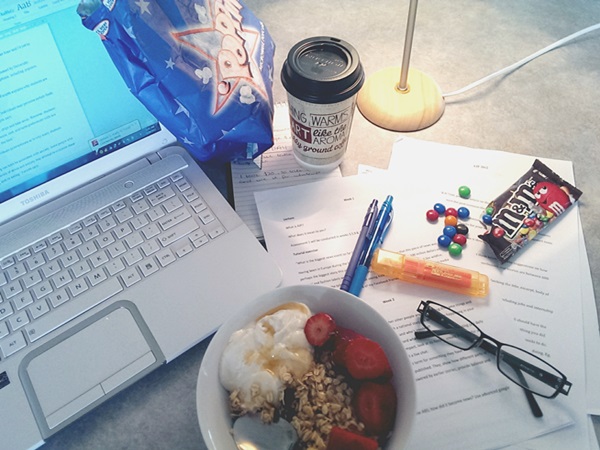Sitting at the desk on the verge of insanity, suffering a severe case of writer’s block, it’s easy to mindlessly consume a second bowl of muesli, two slices of toast, coffee and copious amounts of celery with peanut butter.
And there it is, on a silver platter – well, in a ceramic bowl anyway – a familiar ‘condition’ plaguing many students: procrastineating.
Procrastineating is defined by the Urban Dictionary as: “The art of eating when not hungry to avoid doing a task e.g: assignments, housework, report writing.”
According to a survey conducted by Psychology Today, over 20 per cent of people describe themselves as chronic procrastinators. Postponing tasks – especially ones like reading or studying – is common and, because food is an easy and convenient distraction, overeating can be a simple way to procrastinate.
As I attempt to read, write and revise an assignment that’s due in 48 hours, I thoughtlessly consume ludicrous amounts of food, whether I’m hungry or not. As I do, I wonder how many thousands of other students are out there digging into their bags of chips, packets of Oreos or bowls of ice-cream, just to avoid that often tedious task of putting pen to paper.
After speaking to a collection of university students, it’s obvious that procrastineating is a big part of the study process for many of them.
“I eat a little bit of everything,” one student said.
“I have stashes of candy. And I’ve always got Shapes or Skittles, M&M’s, Pringles or cookies to munch on in my room.”
Another common justification for procrastineating is the brain-food argument: feeding the brain is actually feeding the assignment.
“I said I’d start my homework right after I had a snack. I ended up peeling, cutting and baking some sweet potatoes. It was over an hour and I’d yet to start,” said the student.
Unfortunately, it’s apparent that the majority of snacks consumed by university students, while revising, are most likely to be unhealthy options, often including popcorn, lollies, cake, biscuits and take away foods.
Lecturer in Dietetics and Human Nutrition Adrienne Forsyth explains why students are making unhealthy choices.
“When using food to manage stress and anxiety, individuals may perceive certain foods as more likely to make them feel better,” Forsyth says.
“Common foods selected include chocolate, chips and take-away. However, students may choose their foods based on convenience, cost, and taste preferences with less priority placed on the nutrient value of the food.”
However, the concept of emotional eating is quite complex and there are numerous reasons why individuals may use food for comfort.
“Procrastination and overeating can both be associated with anxiety. Some people who are experiencing significant levels of stress and anxiety may attempt to minimise these feelings by procrastinating and/or eating.
“Some students will turn to ‘comfort foods’, while others will eat anything that is available to avoid thinking about the unpleasant task ahead,” Forsyth says.
Forsyth explains that there are many steps to curb procrastineating and to avoid seeking food as a form of comfort.
“It is important to manage stress and anxiety to minimise the impact they can have on both academic performance and eating behaviours. Plan how and when you will complete your assignments and exam preparation at the start of the semester and stick to your plan.
“Seek academic support if necessary. Plan your meals and snacks at the start of the week, shop accordingly, and make sure you include healthy options for snacking,” Forsyth says.
 Erin Lyons is a third year Bachelor of Journalism (sport) student and a staff writer for upstart. You can follow her on Twitter, @erinmaylyons.
Erin Lyons is a third year Bachelor of Journalism (sport) student and a staff writer for upstart. You can follow her on Twitter, @erinmaylyons.








